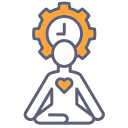Stress Management for Startup Founders
Why Stress Management Matters From Day Zero
Chronic stress quietly drains cognitive bandwidth, increases error rates, and nudges you toward short-term thinking that undermines product quality. It also raises turnover, frays cofounder alignment, and erodes customer trust when communication becomes reactive. Protecting your mental energy is not indulgent; it is core infrastructure for durable execution and competitive advantage.


Why Stress Management Matters From Day Zero
Before burnout arrives, your body whispers: shallow sleep, clenched jaw, irritability at small bugs, and a creeping reliance on caffeine to feel normal. Sunday dread grows. You scroll instead of closing your laptop. Write down two signals you notice most today, then share them with a teammate to normalize early course corrections together.



Pre-mortem journaling to drain fear
Spend five minutes describing how a decision could fail, then list the early signals and safeguards you can install now. Identify what you would do within 24 hours if the worst happens. Fear loses its grip when you have a playbook. Try this on your next hiring decision and tell us what safeguard you added.
The 90-second surge rule for emotional spikes
Emotions peak like waves for roughly ninety seconds. When anger or panic hits, label it silently, set a ninety-second timer, breathe, and do nothing irreversible. Do not Slack, text, or sign anything until the wave passes. You will make fewer apologies and better calls. Share a recent moment where this rule could have saved you.
Red–Yellow–Green triage for your task queue
Mark tasks red if they burn cash or trust today, yellow if they matter this week, and green if they are nice-to-have. Handle red tasks only after a reset, then batch yellows and sweep greens later. This reduces switching and panic-driven busywork. Post your color-coded board screenshot to inspire another founder to simplify.
Design a Team Culture That Reduces Stress
Adopt delayed send on Slack after hours, no-meeting mornings twice a week, and a rotating on-call schedule for true emergencies. Define what urgent means and who decides. The clarity calms everyone. Post your revised communication norms in a shared doc and invite comments so the team feels ownership and follows through.


Design a Team Culture That Reduces Stress
Default to twenty-five- and fifty-minute blocks, require agendas, clarify decision owners, and push status updates to async docs. Cancel any meeting without a clear purpose. One seed-stage team cut six hours weekly using this, and stress dropped alongside calendar load. Try it for two weeks and report your total hours reclaimed.
Sleep and Recovery for High-Stakes Builders
Get outdoor light within an hour of waking, set a caffeine cutoff eight hours before bed, and dim screens ninety minutes before sleep. Swap doomscrolling for a paper page or gentle stretch. Partial credit counts. Commit to one tweak this week in the comments and tag a cofounder to join you.
Sleep and Recovery for High-Stakes Builders
Use a ten- to twenty-minute nap before 3 p.m. or try a non-sleep deep rest audio if you cannot nap. Set do-not-disturb and an alarm. These micro-recoveries restore focus without grogginess. Share your favorite NSDR resource so other founders can build a midday reset that actually fits their calendar.
Sleep and Recovery for High-Stakes Builders
Plan one ninety-minute offline block for movement, one for unstructured play, and one for connection. Do not pay the email tax afterward. A founder named Lina swears this ritual rescued her patience during a tough pivot. Pick your three blocks now and post them so others feel permission to protect theirs too.
Use Your Body as a Dashboard
Look at weekly averages, not daily noise. If HRV dips or resting heart rate rises significantly for three days, reduce intensity, sleep more, and simplify decisions. This prevents overreaching. Remember, trends matter more than single points. Share how you adjust workload when your dashboard flashes yellow.

Ask for Help Early and Often
01
Small groups with monthly hot seats create momentum and normalize hard conversations. Clear rules—confidentiality, candor, no fixing without consent—keep them safe. A WhatsApp check-in after board meetings can be a lifeline. Share how you structure your circle so others can replicate the container and benefit sooner.
02
A therapist helps process patterns and pain; a coach helps convert insight into action. Both return dividends in clarity and relationships. Book a free consult, bring one repeating trigger, and test fit. If it helps you make one better hire or conversation, the ROI is immediate. Tell us what you look for in a great partner.
03
List your top triggers, three grounding tools, and a call tree of people you trust. Add a 24-hour rule for major decisions and a sleep-and-food checklist. Print it, share with one ally, and keep it visible. Post one line from your plan to encourage another founder to create theirs today.
